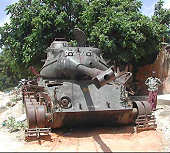 The “Jules Verne,” the automated transfer vehicle (“ATV”) being designed by NASA and the European Space Administration (“ESA”) to ferry supplies to the International Space Station is, by definition, a defense article covered by Category XV of the United States Munitions List (“USML”). As such, technical assistance agreements must be in place for each transfer of technical data on the ATV from U.S. contractors to their European counterparts.
The “Jules Verne,” the automated transfer vehicle (“ATV”) being designed by NASA and the European Space Administration (“ESA”) to ferry supplies to the International Space Station is, by definition, a defense article covered by Category XV of the United States Munitions List (“USML”). As such, technical assistance agreements must be in place for each transfer of technical data on the ATV from U.S. contractors to their European counterparts.
NASA has long complained about these requirements in relation to the International Space Station. In December 2006, NASA requested relief from ITAR requirements for transfers of technical data relating to the International Space Station but this request has not yet been acted on by State. The final report by the International Space Station Independent Safety Task Force, released in February of this year, concluded that these requirements jeopardize the safety of the International Space Station.
At the Washington Space Business Roundtable last week, William Gerstenmaier, NASA’s associate administrator for space operations, revealed what NASA believed to be a “feasible workaround” if the State Department fails to act on NASA’s request. According to Gerstenmaier:
We are actually training civil servants as a workaround. It’s not truly training unique civil servants, but we are utilizing civil servants more than we would have … if we had some of these restrictions removed.
According to Gerstenmaier, civil servants could, under existing rules, interact more freely with their non-U.S. counterparts.
It’s difficult to understand Gerstenmaier’s position here. There is no exemption for civil servants to export technical data. Perhaps what he means is that the private contractors, aware of the restrictions, will refuse to share information with the Europeans whereas a government employee will either be unaware of the restrictions or will believe that the “I was just following orders” defense will shield him or her from liability for export violations. I’m not so sure I would call that a feasible workaround.

 Posted by
Posted by  Category:
Category: 

 A while back we
A while back we  On its website today, OFAC
On its website today, OFAC  A
A  The Directorate of Defense Trade Controls (“DDTC”)
The Directorate of Defense Trade Controls (“DDTC”) 

